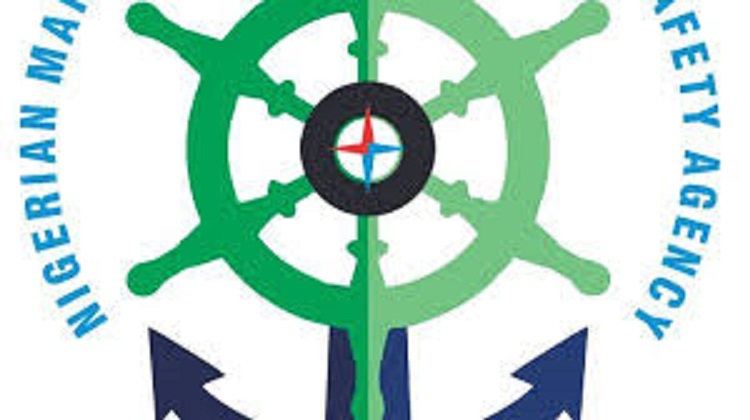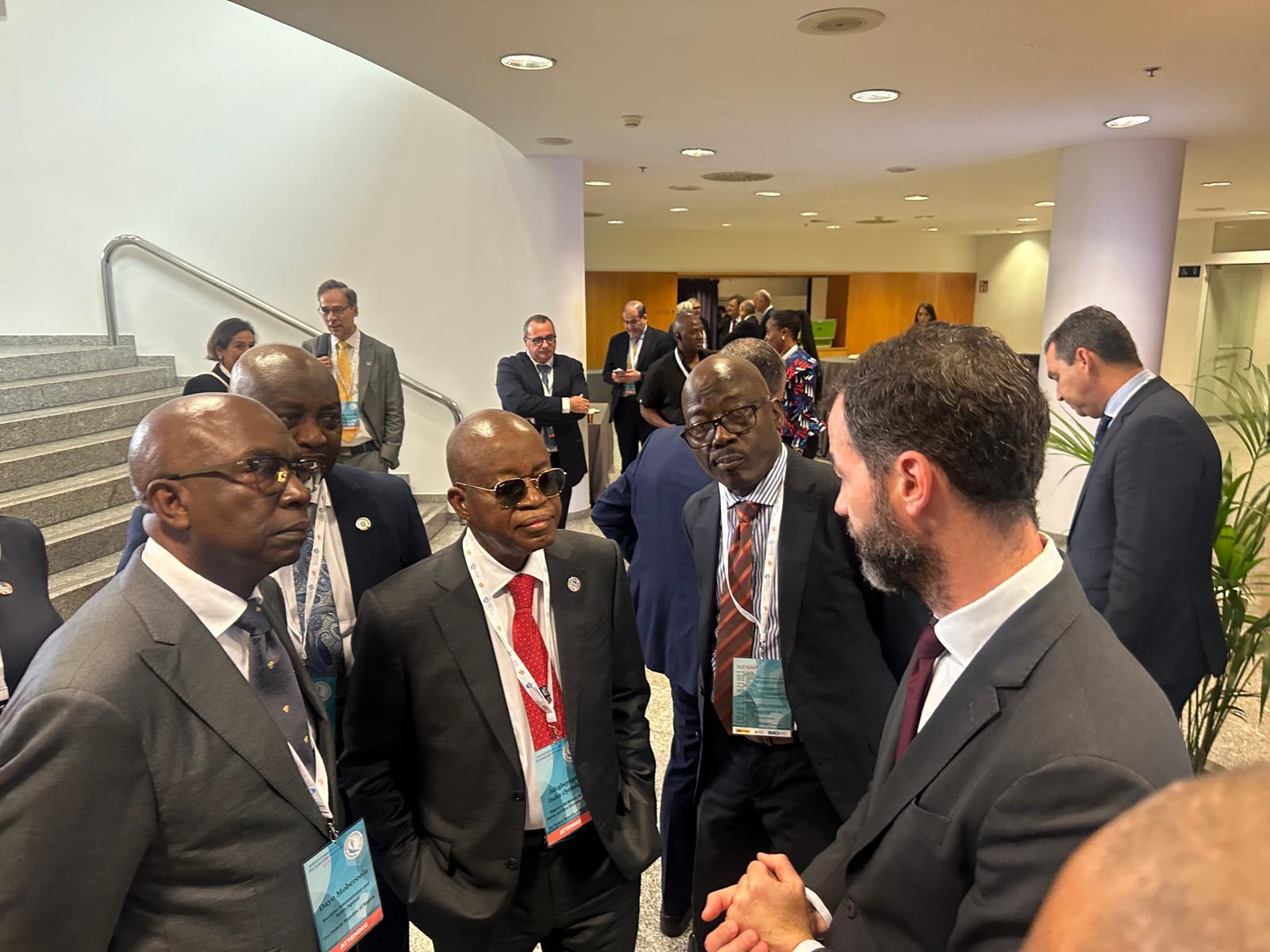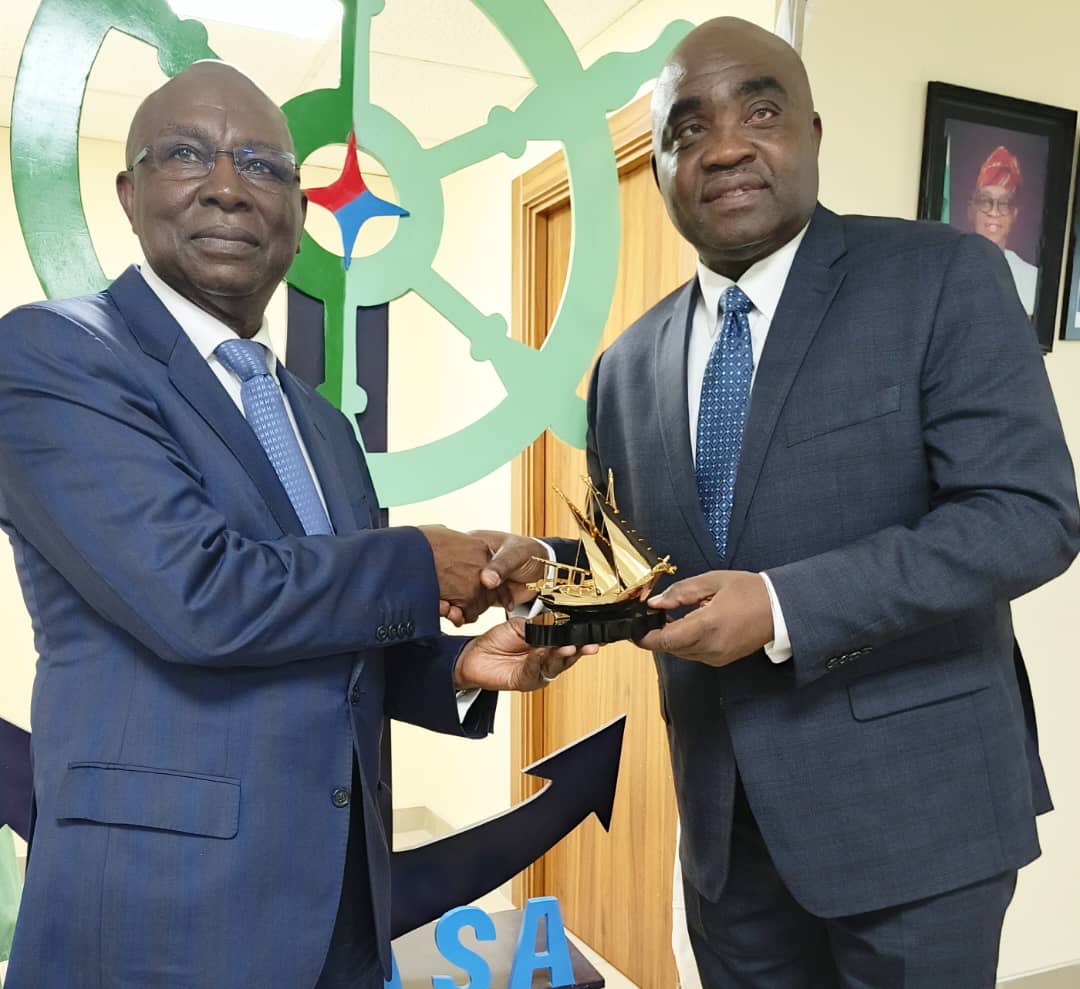Maritime
NEXIM to create synergy with NEPC

ABUJA – The newly appointed ED/CE of the Nigerian Export Promotion Council (NEPC), Mr. Olusegun Awolowo, paid a courtesy call to the Managing D/CEO of the Nigerian Export-Import Bank (NEXIM) at the Headquarters of the Bank in Abuja, to discuss areas of possible collaboration and synergy.
The visit would be the first of such courtesy calls by Mr. Awolowo since he was appointed to the position by Mr. President last December.
Welcoming his counterpart to the Government Trace Policy Bank, Mr. Orya thanked Mr. Awolowo and his team for taking the initial collaborative step, noting that NEPC and NEXIM Bank were the principal agencies of government responsible for the promotion of non-oil exports
The NEXIM MD provided the NEPC team with a snapshot of NEXIM Bank’s mandate, mission and vision stating that the institution was established by Act 38 of 1991 as an Export Credit Agency with the broad mandate to promoting the diversification of the Nigerian economy away from oil and deepening the external sector.
Mr. Orya stated that upon his resumption in August 2009 as the MD/CEO of the Bank, he discovered that the Bank has completely moved away from its core mandate and veered into lending to both oil and gas resulting in a dismal credit performance and loss of both its Shareholders’ and investors’ confidence. This warranted him to seek the approval of the Bank’s Shareholders to initiate a Corporate Transformation Project (Project Spring) that led to the re-definition of the Bank’s Mission, Vision and Strategic Objectives, with the intention of channelling its resources into the development of four sectors [Manufacturing, Agro – Processing, Solid Minerals & Services]. The MASS sectors were deemed to have high amount of employment and foreign exchange earnings.
An outcome of the Corporate Transformation was crafting of new Strategic Objectives to enable the Bank have a clear market focus and become a major contributor to non-oil exports. This is in addition to turning it into a world class institution which imbibes best-in-class corporate governance and risk management practices towards becoming a relevant player in the export market with the capacity to significantly influence government trade policies.
Mr. Orya further informed Mr. Awolowo that the Bank is developing the ECOWAS and other Africa regional markets as the traditional market for Nigerian exporters. The idea is provide a strong platform for our exporters to venture into the more complex markets of Asia and other developed economies in line with the strategy in other jurisdictions where the EXIM Banks first developed their regional market.
Towards developing the ECOWAS market, NEXIM had earlier launched the ECOWAS Trade Support Facility (ETSF) to reduce the level of informal trade and encourage the small scale exporters to use the banking system to leverage their operations.
Mr. Orya informed his counterpart that NEXIM is facilitating the Sealink Project, which will culminate in the establishment of a shipping company to own and operate ocean-going vessels to boost trade within the West and Central Africa. Accordingly, he invited the NEPC to cooperate with NEXIM in making this project a success hinting that an Investment Memorandum to raise the take-off grant of $60million has been prepared in English and French and the private placement is expected to open before the end of January.
On the outcome of the NEXIM Bank’s transformation initiative, Mr. Orya proudly informed his counterpart, “…we may not have achieved every item of the targets we set in our 5-year strategy plan, but we have completely strengthened our operational processes, instituted the strong pillars of corporate governance, risk management…, turned NEXIM Bank from an obscure, loss-making institution to a highly visible and profit-making institution with a robust balance sheet size….We have consistently made and declared profits for three years in a row now, paying dividends to our Shareholders….That has never happened since the Bank was set up in 1991”
In closing, the MD advised NEPC to review the current provisions regarding the Export Expansion Grant to make it more effective, adding that both NEXIM and NEPC needed to work in close collaboration to boost the current level of non-oil exports which had remained below 4% over the past 5 years.
Thanking Mr. Orya for welcoming his team, Mr. Olusegun Awolowo stated that his choice of making NEXIM Bank his first ‘port of call’ upon resumption was based on what he had keenly observed as NEXIM Bank’s innovative disposition to deepening the non-oil sector and committedly contributing to Mr. President’s Transformation Agenda and Vision 20:2020.
The NEPC ED stated that he has great confidence in the country’s ability to meet her development goals and commended the initiatives of NEXIM in enhancing the level of formal trade, noting that the study conducted by NEPC revealed that informal trade annually was about $12bn, far more than the formal trade valued at $3billion. He promised that NEPC would work closely with NEXIM to improve the level of trade flows and also improve the trade statistics.
Mr. Awolowo assured NEXIM Bank that the NEPC was already working towards reviewing the Export Expansion Grant and that the review will cover the qualification criteria and other aspects. According to him, “… the new strategic focus will place greater emphasis on market development, with Nigerians in diaspora as major targets….” He noted that that Trade Commissioners have been appointed in major countries including China, Brazil and London to help in developing markets for Nigerian products, especially for the benefit of millions of our Diaspora citizens.
Lauding the phenomenal successes of the NEXIM Bank Corporate Transformation initiative, Mr. Awolowo informed the NEXIM boss that NEPC is also working on human resource realignment to drive export growth, adding that the objective of the new management was to increase the level of non-oil exports by at least 30% in the next 4 years.
In closing, the CEO invited NEXIM Bank to collaborate with NEPC for higher synergies and stressed that both organizations have significant roles to play in developing the Nigerian non-oil exports and that his leadership would encourage and foster even closer collaboration between the two institutions towards supporting Mr. President’s Transformation Agenda and achieving Vision 20:2020 .
Maritime
NIMASA Makes Dockworkers Registration Compulsory

The management of the Nigerian Maritime Administration and Safety Agency (NIMASA) has advised International Oil Companies, terminal and jetty operators, and all other companies involved in stevedoring in the country to refrain from engaging unregistered dockworkers.
The information was contained in a statement made available to Biztellers by the Head, Public Relations, NIMASA, Osagie Edward.
ALSO READ: Maritime Security: IMP SG Commends Nigeria, Meets NIMASA DG
According to the statement, all stakeholders, including dock labour employers and stevedoring companies, are encouraged to apply for new operating licenses or renew expired ones within a 30-day moratorium period.
“This requirement,” it added, “is stipulated by the NIMASA Act of 2007 and outlined in the NIMASA Stevedoring Regulations of 2014, which mandates strict compliance from all maritime operators.”
Osagie cited the Director General, NIMASA, Dr. Dayo Mobereola as laying emphasis on the need for stakeholders to comply with extant laws and regulations.
Dr Mobereola said, “No terminal or company shall continue to engage the services of unregistered dockworkers for cargo handling at their work locations.
“This move is part of our broader effort to ensure safe and regulated operations within Nigeria’s maritime industry. Compliance with these regulations will enhance our ability to maintain an up-to-date database of dockworkers operating in the country. It also improves our planning processes, as we are committed to developing their capacity to meet globally accepted standards for dockworkers in Nigeria. We intend to enforce full compliance after the moratorium period.”
It was gathered that the NIMASA Act, 2007, Part IX, Section 27, addressed the registration of Dockworkers with focus on Maritime Labour.
“It ensures the Registration, Regulation, and control of Maritime Labour, including dockworkers. The Act assigns the Agency the responsibility of maintaining standards in accordance with international best practices,” Osagie added.
Maritime
Maritime Diplomacy: Nigeria Seeks Election Into IMO Council

Nigeria has expressed a strong desire to seek election into Category “C” of the International Maritime Organization (IMO) Council.
The Honorable Minister of Marine and Blue Economy, Adegboyega Oyetola, made the disclosure at the 2024 World Maritime Day parallel event in Barcelona, Spain.
Oyetola noted that Nigeria has put in place the basic needs for the development of her maritime industry in line with recognized global best practices.
In his words, “our active participation in upholding key conventions, such as the Safety of Life at Sea (SOLAS) and the International Ship and Port Facility Security (ISPS) Code, reflects our dedication to ensuring the safety of international shipping.
ALSO READ: Snakes, Scorpions Endanger Students At UNTH, Ituku-Ozalla
There have been no incidents of piracy in the last three years, as confirmed by the International Maritime Bureau (IMB). By deploying resources to provide maritime security assets, Nigeria has solidified its role as a key guardian of maritime security in the Gulf of Guinea.
Nigeria remains a valuable source of manpower for the industry. I therefore urge our partners to explore this potential and assist where possible in the best interest of all. Our Maritime Academy has adequate resources and facilities to support this development.
“I am pleased to announce Nigeria’s resolve to seek a Category “C” membership on the Council.
On his part, the Director General of the Nigerian Maritime Administration and Safety Agency (NIMASA), Dr. Dayo Mobereola, assured that no stone will be left unturned to ensure success in the quest for IMO Category C membership at the next elections.
According to him, “We at NIMASA have met with the IMO technical team and have commenced work on all identified grey areas so that Nigeria can address the gaps identified during the last audit by the IMO.
”We have also commenced the process of effective communication with other member states using the IMO GSIS platform, among others. While we at NIMASA focus on the technical aspects of the preparations, our supervising Ministry will provide the political will to guide Nigeria back to the Council at the IMO.”
Oyetola, who held engagement sessions with the IMO Secretary General Arsenio Dominguez and other diplomats, was accompanied on the working tour by the Ministry’s Permanent Secretary, Mr. Olufemi Oloruntola; the Director General of the NIMASA; the Managing Director of the Nigerian Ports Authority (NPA), Dr. Abubakar Dantsoho; the Managing Director of NIWA, Mr. Bola Oyebamiji; and the Director of Maritime Safety and Security Services, Mr. Babatunde Bombata.
This year’s parallel event with the theme: Navigating the Future: Safety First, brought together international maritime leaders and experts to discuss future challenges and opportunities, with the aim of ensuring that safety is prioritized in the day-to-day operations of the global maritime sector.
Maritime
Why PPP Is Necessity For Nigeria’s Maritime Infrastructural Dev’t – Mobereola

The adoption of the Public Private Partnership (PPP) model is essential for the infrastructural development of Nigeria’s maritime sector.
This is the view of the Director General of the Nigerian Maritime Administration and Safety Agency (NIMASA), Dr. Dayo Mobereola.
The DG, shared his views while hosting the Director General of the Infrastructure Concession Regulatory Commission (ICRC), Dr. Jobson Oseodion Ewalefoh.
He emphasized the importance of the Commission’s increased involvement in attracting private investors to develop infrastructural capacity in Nigeria’s maritime sector.
ALSO READ: Aradel Holdings Admitted To NGX’s Main Board, Boosts Market Capitalization By N3.05 Trillion
Dr. Mobereola said, “We appreciate the Management of the ICRC for being responsive. However, you know that the maritime sector is capital intensive and government funds cannot solely put in place the required infrastructure. We need the ICRC to develop PPP based business models that will be attractive to the private sector both from within and outside the country.
“There is the need to streamline processes by the use of technology, as we will continue to count on the support of ICRC to help drive the Agency’s PPP projects for effective and efficient service delivery to our stakeholders”.
Lending support to Dr. Mobereola’s views, Dr. Ewalefoh, underscored the significance of the maritime sector to Nigeria’s economy.
He noted that the PPP model would facilitate increased funding and expertise from the private sector, thereby accelerating the growth and development of the Nigerian maritime sector. Additionally, he stated that the ICRC is prepared to engage with the Agency on its projects and ensure timely execution.
“There is no time to waste; our country needs lots of funding for infrastructure and we need to create an enabling environment for activities to thrive. First, is service delivery, not revenue generation, and people will be willing to pay if they get the right services”, the ICRC boss noted.
The PPP model has proven to be the most viable approach worldwide for driving government policies that promote development and economic growth.
Biztellers reports that as a regulatory agency and Nigeria’s Maritime Administrator, the NIMASA has consistently embraced collaboration and partnership through the PPP initiative to ensure the growth and development of the maritime sector.











